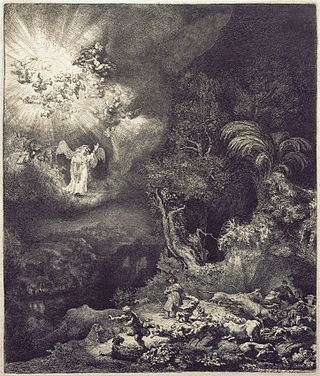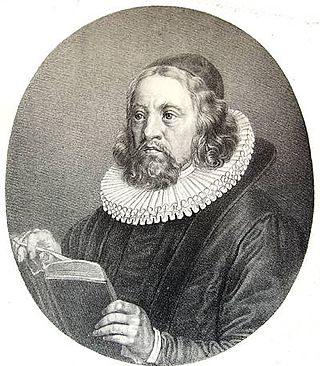
Nikolaj Frederik Severin Grundtvig, most often referred to as N. F. S. Grundtvig, was a Danish pastor, author, poet, philosopher, historian, teacher and politician. He was one of the most influential people in Danish history, as his philosophy gave rise to a new form of nationalism in the last half of the 19th century. It was steeped in the national literature and supported by deep spirituality.

"It Came Upon the Midnight Clear", sometimes rendered as "It Came Upon a Midnight Clear", is an 1849 poem and Christmas carol written by Edmund Sears, pastor of the Unitarian Church in Wayland, Massachusetts. In 1850, Sears' lyrics were set to "Carol", a tune written for the poem the same year at his request, by Richard Storrs Willis. This pairing remains the most popular in the United States, while in Commonwealth countries, the lyrics are set to "Noel", a later adaptation by Arthur Sullivan from an English melody.

Thomas Hansen Kingo was a Danish bishop, poet and hymnwriter born in Slangerup, near Copenhagen. His work marked the high point of Danish baroque poetry.

Philipp Nicolai was a German Lutheran pastor, poet, and composer. He is most widely recognized as a hymnodist.

Danish literature a subset of Scandinavian literature, stretches back to the Middle Ages. The earliest preserved texts from Denmark are runic inscriptions on memorial stones and other objects, some of which contain short poems in alliterative verse. In the late 12th century Saxo Grammaticus wrote Gesta Danorum. During the 16th century, the Lutheran Reformation came to Denmark. During this era, Christiern Pedersen translated the New Testament into Danish and Thomas Kingo composed hymns. Fine poetry was created in the early 17th century by Anders Arrebo (1587–1637). The challenges faced during Denmark's absolute monarchy in 1660 are chronicled in Jammersminde by Leonora Christina of the Blue Tower. Ludvig Holberg (1684–1754), influenced by the ideas of the Enlightenment and Humanism, is considered the founder of modern Danish and Norwegian literature. Neoclassical poetry, drama, and the essay flourished during the 18th century influenced by French and English trends. German influence is seen in the verse of the leading poets of the late 18th century such as Johannes Ewald and Jens Baggesen. Other 18th century writers include the hymn writer Hans Adolph Brorson and the satirical poet Johan Herman Wessel.

Danish Americans are Americans who have ancestral roots originated fully or partially from Denmark. There are approximately 1,300,000 Americans of Danish origin or descent.
"Fairest Lord Jesus", also known as "Beautiful Savior", is a Christian hymn.

The Norwegian Lutheran Church in the United States is a general term to describe the Lutheran church tradition developed within the United States by immigrants from Norway.
God's Word Is Our Great Heritage, is the title of a popular hymn sung in many churches, especially the Lutheran Church. This hymn was inspired by Psalm 16:6: "...yea, I have a goodly heritage."KJV
John A. Dalles is a clergyman and hymnwriter who was born in Pittsburgh, Pennsylvania, United States. A graduate of Penn State, Lancaster Theological Seminary and Pittsburgh Theological Seminary, he is an ordained minister in the Presbyterian Church (U.S.A.). Having served the First Presbyterian Church of South Bend, Indiana and the Fox Chapel Presbyterian Church, from 1997 until 2019 he served as Senior Pastor of Wekiva Presbyterian Church in Longwood, Florida. Following his 22-year senior pastorate at Wekiva, he was the Interim Senior Minister and Head of Staff of the Shadyside Presbyterian Church, in Pittsburgh, 2019-2021.
Gerald Moultrie was a Victorian public schoolmaster and Anglican hymnographer born on 16 September 1829 in Rugby Rectory, Warwickshire, England. He died on 25 April 1885 in Southleigh, England, aged 55.

Gottlieb Bender Christiansen was an American Lutheran Minister who served as President at Trinity Seminary in Blair, Nebraska and was the first president of the United Danish Evangelical Lutheran Church.
Kristian Anker was a Lutheran minister who served as the first president of the combined Trinity Seminary and Dana College.
Bartholomäus Ringwaldt was a German didactic poet and Lutheran pastor. He is most recognized as a hymnwriter.

Jens Christian Hostrup was a Danish poet, dramatist and priest. Comforting and encouraging the people, he created poems that filled the hearts of his compatriots. His precise personal and environmental descriptions, as well as succinct dialogue, were welcomed by the critics and contemporaries. His dramas were on current topics such as feminism, free love and home, maybe one of the reasons why he often used the pseudonym Jens Kristrup (Christrup).

Danebod is a historic district at the south edge of the railway town of Tyler in southwestern Minnesota. Founded in 1885 by Danish Evangelical Lutherans led by Rev. Hans Jørgen Pedersen (1851–1905), the district comprises a group of buildings dating back to 1888 from Minnesota's oldest Danish immigrant settlement. Danebod remains until this day a predominantly Danish Lutheran, close-knit religious community. An annual celebration named Æbleskiver Days, held on the fourth weekend of July, celebrates Danish heritage and culture and includes a parade that goes down the town's main street with floats that are made by the various Danebod neighborhoods.

Guldberg's hymnal is a hymnal that was created by Bishop Ludvig Harboe and Ove Høegh-Guldberg and was authorized for use in 1778.
Birgitte Cathrine Boye was a Danish hymnwriter.

"Es woll uns Gott genädig sein" is a Lutheran hymn, with words written by Martin Luther based on the Psalm 67. The hymn in three stanzas of nine lines each was first published in Wittenberg in 1524. Its best known hymn tune, Zahn No. 7247, was published in Strasbourg in 1524. Heinrich Schütz and Johann Sebastian Bach wrote settings of the hymn. It was translated to English and has appeared in dozens of hymnals.












